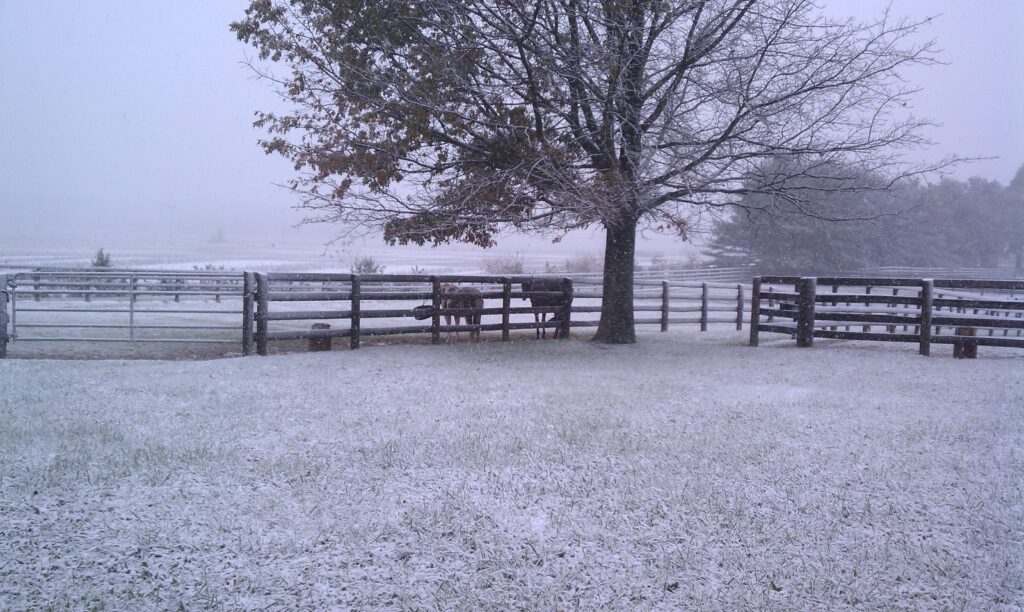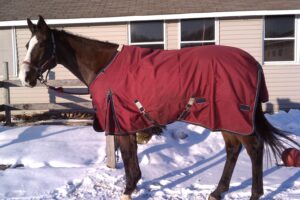Main Content
As the weather gets colder I get more questions as to what horse owners can do to keep their horses from losing weight, how to keep them warmer, and how to go about safely riding them all winter long. Hopefully I can address some of your thoughts and concerns here before more real winter weather hits us in New Jersey.

In the winter all horses need extra energy to help keep them warm. Horses’ energy (or caloric) intake will generally increase about 25% during the winter months. Usually this can be accomplished by feeding extra hay. This is the MOST IMPORTANT thing to realize about winter-feeding—horses need extra hay! This will help keep them warm through the heat of fermentation produced in the hindgut (cecum and colon) when digesting/fermenting forage. Many people will ask what kinds of feed to use to increase their horse’s energy during the winter. Easy keepers will be fine on good quality free choice grass. Hard keepers would need free choice good quality grass hay or grass/legume (alfalfa or clover) mix plus grain supplement. Horses still in training should be fed similar to the hard keeper, plus electrolytes if they have been sweating because of their heavy hair coat.
To determine if your horse needs extra energy it is best to check for decreased body weight and body condition. You need to feel through the horses’ heavy hair coat; do you feel ribs easily? If so, they need more energy! Are they shivering a lot? If so, they need more energy! Shivering helps animals thermoregulate, but they require energy to do so.
Would a horse need a supplement over the winter months? Maybe, here are some reasons why they might. If hay quality has decreased due to availability problems this will reduce vitamin and mineral content. Supplementing a poor quality hay diet with a multi-vitamin/mineral supplement specifically formulated for horses is a good idea during the winter months. If a horse is stalled continuously, some may become extremely stressed; they will have a decreased immune function and/or potentially develop gastric ulcers. Keeping hay in front of them at ALL times will help decrease the risk of ulcers when stalled. Providing a vitamin E supplement (around 1000 IU/day) will help decrease the stress and increase the immune function during this period of time.
Rice bran can be added to diets in the winter. This is good for adding energy, fat and fiber to the diet. Rice bran is very palatable, so it will also stimulate a picky horse to eat and will increase the energy density of the diet. This is particularly beneficial to the horse that could use a little extra weight, or is still in training.
Do not be afraid to feed alfalfa! Alfalfa is a great way to increase the protein level of most forage sources. Feeding an alfalfa/grass hay mix is a great source of hay for that ‘hard keeper’ or that horse that is still growing or in training. Extra protein is not necessarily needed for horses in the winter unless, again, the horse is still growing. The average horse can maintain themselves on 10 to 12% protein in the total diet. However, if you have no forage available other than poor quality grass hay (which is probably only 6 to 8% protein), you may want to increase the protein level by adding alfalfa. If you would like more information on different feeding strategies in the winter to keep your horse healthy and warm, see the fact sheet Winter Feeding for Horses.
In regard to housing and shelters over the winter, it is best to look at their individual circumstances during the winter months to figure out what is best. For example, even in the harshest winter, most horses do not need to be stabled in a barn if there is shelter from the elements in the form of a run-in shed or even a dense stand of trees. However, most horses, whether or not they are kept outside, will grow a longer hair coat during this time due to the shorter photoperiod. This longer, denser hair coat will help keep them warm and prevent heat loss. Even in snowy conditions, horses can stay healthy even outside. You might notice that snow will accumulate on their backs, which is good. Once you see snow melting on top of them, this means they are losing too much heat and should be either brought inside or blanketed. Horses that are shivering are also okay as long as they are maintaining their body weight and their coat is dry. Shivering is a way to help the body stay warm. If the shivering lasts longer than a few hours or they are wet, they might need to be brought inside or blanketed.

It is not necessary to blanket a horse in winter as long as it has a naturally thick hair coat and is adapted to the cold. If horses are exercised regularly to the extent of generating sweat through the winter months, it is usually best to at least partially clip their long hair. Body clipped horses may have higher energy needs than an unclipped horse due to their increased exercise regime and excess heat loss. Be aware that the hair will not grow back rapidly in the winter, so once horses are clipped, they must have the appropriate shelter and blankets to keep them warm for the rest of the winter and into the early spring months. For more on blanketing and clipping, see the NJAES fact sheet #1081 To Blanket or Not to Blanket.
One other potential issue with keeping horses in a barn during winter weather is with respiratory health. A horse’s respiratory system during the winter can be a cause for concern if housed indoors where there is limited ventilation. Ventilation should be maximized by keeping windows/doors open as much as possible, even in very cold weather. Ceiling fans/vents also facilitate adequate air exchange. Wet bedding and manure should be completely removed at least once a day to prevent excess ammonia inhalation. Also, extremely dusty types of bedding should be avoided if stalling horses for long periods of time. It is also ideal if horses do need to be stalled for example, during ice storms and the subsequent days to come, to have some sort of exercise whether they get hand walked over a cleared driveway, ridden in an indoor arena or even turned out for limited durations in an indoor arena or areas where there is no ice. You can also discuss with your farrier suggestions for foot care of horses that will also be ridden in the winter. For more information on housing and riding horses in the winter see the fact sheet Winter Care for Horses.
Hope these tips help you through the winter! Good luck and if you are like me, you are praying for an early spring!!
By Carey A. Williams, Ph.D., Equine Extension Specialist for Rutgers, the State University of New Jersey, and Associate Director of Extension for the Equine Science Center.